#it seems like Ukrainians are more willing to take risks in order to save lives than others are
Text
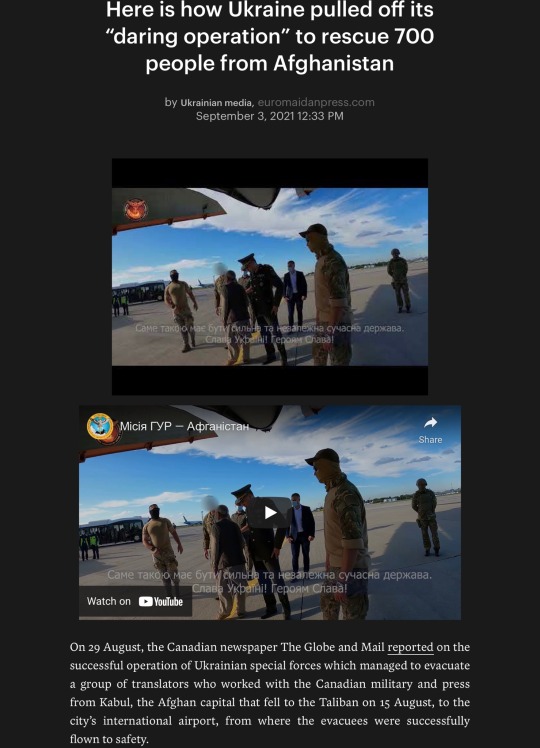
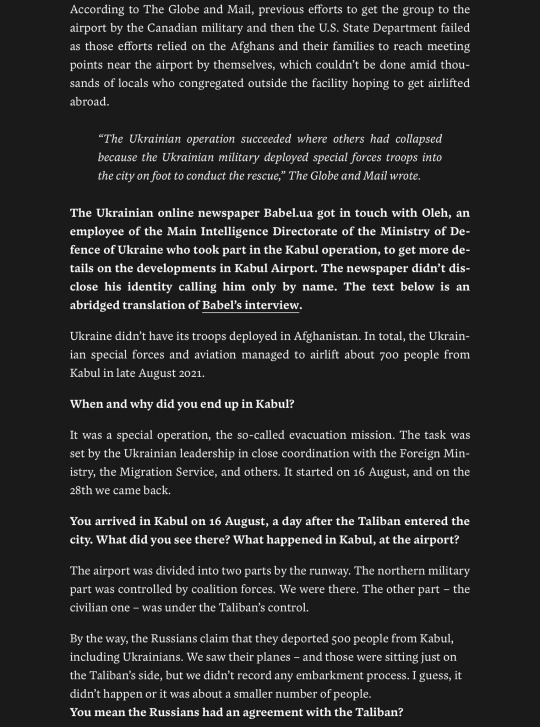
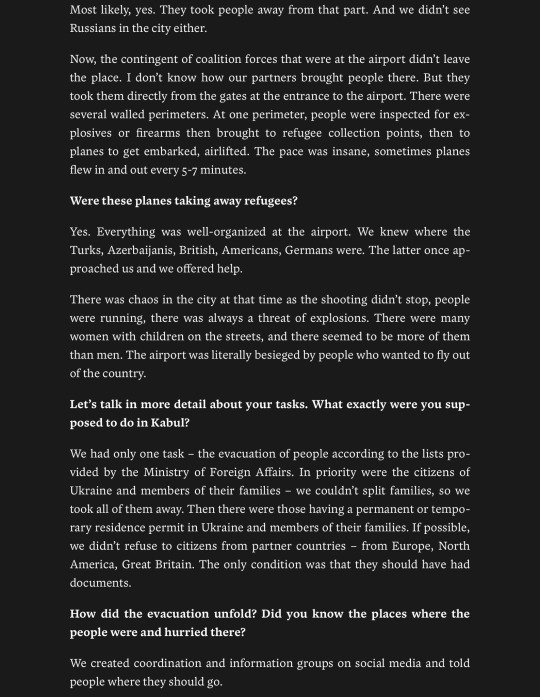
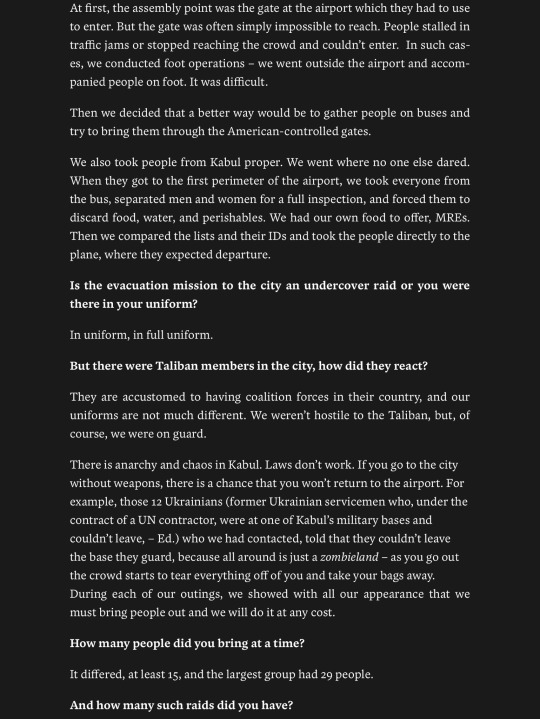
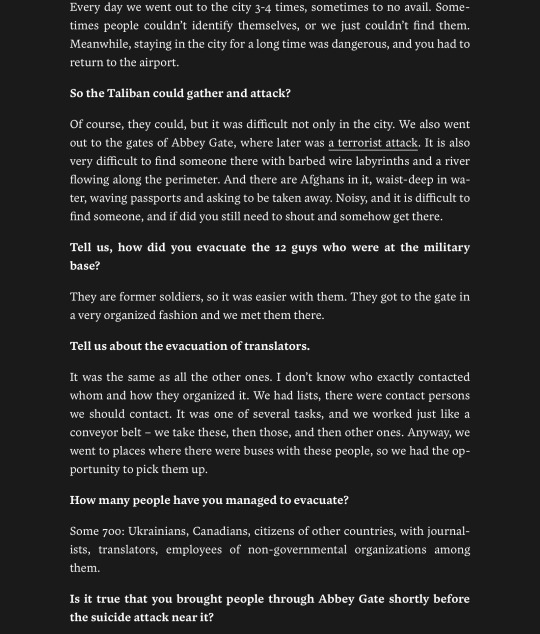
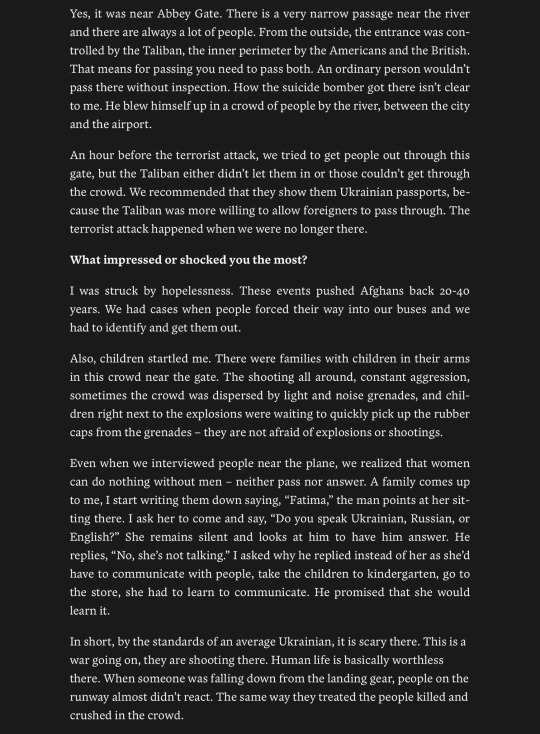
Source: https://euromaidanpress.com/2021/09/03/here-is-how-ukraine-pulled-off-its-daring-operation-to-rescue-700-people-from-afghanistan/
#Ukraine#Ukrainian special forces#they were always badass#this reminds me so much of when Ze said that Ukrainians always helped other people#it seems like Ukrainians are more willing to take risks in order to save lives than others are#in that way it kind of reminds me of the helicopter flights to Azovstal#I’m not saying it’s the same thing#I just don’t think most other people would have done either operation#I do wonder though how it all came to be#sounds to me like the Ukrainians wanted to save their people#and other countries either became aware or were made aware of the operation#and then just said ‘hey we have people there too - would you take them with you pretty please?’#wonder if they got credit for it afterwards
8 notes
·
View notes
Link
Soraya Roberts | Longreads | January 2020 | 8 minutes (1,978 words)
“And when they bombed other people’s houses, we / protested / but not enough, we opposed them but not / enough …” On January 3rd, Ukrainian immigrant Ilya Kaminsky quote-tweeted his poem, “We Lived Happily During the War,” after it went viral the day Iranian general Qassem Suleimani was assassinated on the order of President Donald Trump. The poem appeared in his long-awaited 2019 poetry collection, Deaf Republic, about a town that responds to the killing of a deaf child by itself going deaf, a parable of the present-day United States, a country that responds to its own demise (and the rest of the world’s) by blocking its ears. His tweet went up in the midst of increasing tensions between the U.S. and Iran and ahead of the death of more than 50 people in a stampede during Suleimani’s funeral procession. It went up months into bushfires ravaging New South Wales that have destroyed millions of hectares and killed roughly half a billion animals. It went up in the wake of a slew of antisemitic attacks across the country. Last Sunday, while thousands in New York marched in solidarity with the Jewish community, the Hollywood awards season kicked off in Los Angeles with the Golden Globes, and the media started gleefully tweeting about couture as though the destruction of the world had politely paused for the occasion. The timing made me think of a friend who recently asked: What if all the people who went to see Star Wars: The Rise of Skywalker — tens of millions of Americans — protested instead?
“Now’s NOT the time to live happily,” read Kaminsky’s tweet after he extended his thanks for his poetry’s dissemination. He did not squander the moment the way so many of us often do, advising instead that we “write quality journalism & spicy op-eds & protest poems, get out in the street if you’re able. We won’t live happily during another war.”
But aren’t we already?
* * *
In April, when the Notre-Dame threatened to burn to the ground, a bunch of billionaires fell all over themselves pledging to restore the Gothic cathedral (which turned out to be a lot of bluster — the fundraising goal was largely met by small donations). The mega-rich have been comparatively quiet in response to Australia’s bushfires, which are exponentially more devastating, broadcasting their priorities all the louder. Columnist Louis Staples noted that billionaires tend to run businesses with the sorts of carbon footprints that fuel climate change, the clear cause of the conflagrations. “Also Notre Dame is a landmark in a world famous city,” he wrote, “whereas the Australian wildfires have mostly affected rural, sparsely populated areas.” This confers a kind of poetry on their predilection. Notre-Dame is not only one of France’s most powerful religious and cultural symbols, it was also looted during the French Revolution because it was emblematic of the country’s — and the church’s and the monarchy’s — plutocracy. Marie Antoinette lost her head, but so too did Notre-Dame’s statues. That billionaires pledged to rebuild this historic monument to inequity amidst worldwide uprisings against oppression and large-scale environmental destruction speaks to where their allegiances continue to lie.
More than morals, more than guilt, the number one concern of the ultra-rich appears to be rebellion — the threat of those with less coming for those with more. In the New Yorker this month, a profile of the Patriotic Millionaires, “a couple hundred” rich Americans (at least $1 million in income; more than $5 million in assets) who push for policies to address income inequality, had them voicing this fear repeatedly. Tech exec William Battle, who was raised Republican but veered left after Trump’s election, somewhat comically told the magazine (in a whisper, I have to imagine), “We could have — I don’t want to say it, but, riots.” It tickles me to think of a bunch of exceedingly rich idiots walking around with their knickers in a twist of terror over an imaginary enemy, while in reality the horrors of the world largely originate with them. Paraphrasing Walter Scheidel, author of The Great Leveler: Violence and the History of Inequality from the Stone Age to the Twenty-first Century, the New Yorker’s Sheelah Kolkhatar explained, “levelling happens much more often because of the collapse of a state, such as the fall of the Roman Empire; because of deadly pandemics, like the black death of the thirteen-hundreds, which killed so many people that there were labor shortages and workers’ wages went up; and because of mass-mobilization warfare, such as the two World Wars.” Sound familiar? States are too in control to bow to pitchforks; what they can’t control are natural (“natural”) disasters. Fire, flooding, starvation, disease. Which isn’t to say they aren’t trying.
“Disarm the lifeboats.” This is the title Jonathan M. Katz, who made his name reporting on the 2010 Haiti earthquake, chose for his latest The Long Version newsletter. It’s a reference to journalist Christian Parenti’s 2011 book Tropic of Chaos: Climate Change and the New Geography of Violence, which builds on a model of panic proposed by Lee Clarke and Caron Chess. These two academics claim that panic weakens social bonds, reducing the likelihood of crisis resolution, but that it is in fact rare in disaster situations. But people’s enduring belief in this myth — the truthy trope that the public panics in a crisis — ironically leads to actual “elite panic”: powerful people hoarding authority and resources and withholding information. And this panic is actually worse. “Because the positions they occupy command the power to move resources,” Clarke and Chess write, “elite panic is more consequential than public panic.” To get an idea of the sort of consequences they’re talking about, go to any newspaper. It will bear out Parenti’s prediction that elite panic results in what he calls “the politics of the armed lifeboats,” where “strong states with developed economies will succumb to a politics of xenophobia, racism, police repression, surveillance, and militarism and thus transform themselves into fortress societies while the rest of the world slips into collapse.” The failure to mitigate disaster — through cooperation and redistribution, through working together instead of apart — inevitably leads to the collapse of these lifeboats as well.
But in the meantime, as Kaminsky wrote, “I was / in my bed, around my bed America / was falling: invisible house by invisible house by invisible house.” Within the center of the country’s plush cocoon, far away from the laps of floods, or the waves of heat, or the growling hunger, or the roving pestilence, we are comfortable enough to be lulled into complacency. Sprawling homes constructed by capitalism have taught us to individualize and to consume, and so in the midst of a crisis, we respond by purchasing self-help, by buying into self-care, by looking after ourselves as a first port of call, as though anything else really comes second, as though after that massage we will actually extend a hand to anyone else. “I believe that each person has the opportunity to offer the gift of their own higher level of consciousness,” Oprah told The Today Show earlier this month. “You can only heal the world when you are healed yourself.” The feel-good cliché is hard to shake because it isn’t entirely wrong. You do have to be well before you can take care of others, right? Aren’t we always told during in-flight safety routines to put the mask on ourselves first? Except we never seem to get further than that. Those in distress, who feel less cocooned, always seem to be fighting alone. In a recent interview with The Guardian, DeRay McKesson discussed the burnout faced by people of color who have been part of Black Lives Matter protests while the larger population sat in bed and watched on TV. “We saw that people were going to say, ‘Oh, my God, people should be in the street,’ but would never join us,” he said. “We saw that people weren’t willing to risk much.” Outside the lifeboat, they got tired, and inside the lifeboat, the messiah — the one on Netflix, I mean — provided a higher calling.
* * *
“In the street of money in the city of money in the country of money, our great country of money, we (forgive us) / lived happily during the war.” The last line of Kaminsky’s poem seemed to be host Ricky Gervais’s inspiration at the Golden Globes on Sunday. Before anyone could even take the stage, he castigated the ballroom full of famous faces for living happily, despite some of them — including Michelle Williams and Patricia Arquette — going on to address the war raging outside. “If you do win an award tonight, don’t use it as a platform to make a political speech,” he warned. “You’re in no position to lecture the public about anything.” And yet Gervais himself broke his own rule, pleading at the end of the show to “please donate to Australia.” I consider this about-face a positive sign, the synthetic lifeboat losing buoyancy despite itself. Gervais’s inability to follow his own dictate shows the weakness of the fortress the West tries so hard to enforce in the face of the current calamity; the invisible ruins have suddenly become visible, even when we are watching from our bedrooms. This is the sound of Australia denouncing its prime minister for refusing to acknowledge the climate change, the sound of Americans protesting their president for attacking Iran, it is even the sound of Anand Giridharadas’s viral tweet pointing out that 500 of the richest people in the world could save the planet, if only they would work together.
“Climate scientists have modeled out how global temperatures might shift in different geopolitical scenarios,” wrote environmental journalist Emily Atkin in her newsletter Heated last week. “And the scenario that always ends up with the planet in fiery climate chaos is the so-called ‘regional rivalry’ scenario — to put it simply, the one where everyone is fighting, borders are closed, and rich white-led countries like the U.S. are super racist toward less-wealthy countries filled with brown people.” Which means the opposite is also true, the planet survives in the global community scenario in which everyone is cooperating, borders are open, and all countries are equal. So here’s the choice: You can face guaranteed death in the comfort of solitude, the chaos outside muffled by Disney and Netflix, Justin Trudeau’s beard, and Prince Harry and Meghan Markle’s royal defection, by any solipsistic interest, really, which does not involve engaging with the external world. Or you can face the cataclysm, you can bathe in discomfort and unrest, you can engage with it in your work and your life along with everyone else, and with them work toward survival. Refusing to rock the boat for fear of making anyone uncomfortable right now does not mean the boat is not still fated to sink in the end. If we keep continuing as we have, the Crisis of the Third Century, in which the Roman Empire almost folded due to combined political, social, and economic crises, could very well become the Crisis of the Twenty-First. In an interview with Chinese Poetry Quarterly in 2011, Kaminsky even compared present-day America to latter-day Rome. “The Roman Empire has produced many things that were valuable to modern civilization. But at what cost to other nations? This is the question anyone living in the U.S.A. today, particularly its authors, should be asking,” he said. “Anyone who reads and writes books should attempt to see with clarity the world they live in, pay taxes in, support by mere being there. Not everyone is guilty, Dostoevsky used to say, but everyone is responsible.”
By which he means: Rock the boat, especially if you’re in it, even if you don’t have a life jacket of your own.
* * *
Soraya Roberts is a culture columnist at Longreads.
0 notes
Text
Happily Never After
Soraya Roberts | Longreads | January 2020 | 8 minutes (1,978 words)
“And when they bombed other people’s houses, we / protested / but not enough, we opposed them but not / enough …” On January 3rd, Ukrainian immigrant Ilya Kaminsky quote-tweeted his poem, “We Lived Happily During the War,” after it went viral the day Iranian general Qassem Suleimani was assassinated on the order of President Donald Trump. The poem appeared in his long-awaited 2019 poetry collection, Deaf Republic, about a town that responds to the killing of a deaf child by itself going deaf, a parable of the present-day United States, a country that responds to its own demise (and the rest of the world’s) by blocking its ears. His tweet went up in the midst of increasing tensions between the U.S. and Iran and ahead of the death of more than 50 people in a stampede during Suleimani’s funeral procession. It went up months into bushfires ravaging New South Wales that have destroyed millions of hectares and killed roughly half a billion animals. It went up in the wake of a slew of antisemitic attacks across the country. Last Sunday, while thousands in New York marched in solidarity with the Jewish community, the Hollywood awards season kicked off in Los Angeles with the Golden Globes, and the media started gleefully tweeting about couture as though the destruction of the world had politely paused for the occasion. The timing made me think of a friend who recently asked: What if all the people who went to see Star Wars: The Rise of Skywalker — tens of millions of Americans — protested instead?
“Now’s NOT the time to live happily,” read Kaminsky’s tweet after he extended his thanks for his poetry’s dissemination. He did not squander the moment the way so many of us often do, advising instead that we “write quality journalism & spicy op-eds & protest poems, get out in the street if you’re able. We won’t live happily during another war.”
But aren’t we already?
* * *
In April, when the Notre-Dame threatened to burn to the ground, a bunch of billionaires fell all over themselves pledging to restore the Gothic cathedral (which turned out to be a lot of bluster — the fundraising goal was largely met by small donations). The mega-rich have been comparatively quiet in response to Australia’s bushfires, which are exponentially more devastating, broadcasting their priorities all the louder. Columnist Louis Staples noted that billionaires tend to run businesses with the sorts of carbon footprints that fuel climate change, the clear cause of the conflagrations. “Also Notre Dame is a landmark in a world famous city,” he wrote, “whereas the Australian wildfires have mostly affected rural, sparsely populated areas.” This confers a kind of poetry on their predilection. Notre-Dame is not only one of France’s most powerful religious and cultural symbols, it was also looted during the French Revolution because it was emblematic of the country’s — and the church’s and the monarchy’s — plutocracy. Marie Antoinette lost her head, but so too did Notre-Dame’s statues. That billionaires pledged to rebuild this historic monument to inequity amidst worldwide uprisings against oppression and large-scale environmental destruction speaks to where their allegiances continue to lie.
More than morals, more than guilt, the number one concern of the ultra-rich appears to be rebellion — the threat of those with less coming for those with more. In the New Yorker this month, a profile of the Patriotic Millionaires, “a couple hundred” rich Americans (at least $1 million in income; more than $5 million in assets) who push for policies to address income inequality, had them voicing this fear repeatedly. Tech exec William Battle, who was raised Republican but veered left after Trump’s election, somewhat comically told the magazine (in a whisper, I have to imagine), “We could have — I don’t want to say it, but, riots.” It tickles me to think of a bunch of exceedingly rich idiots walking around with their knickers in a twist of terror over an imaginary enemy, while in reality the horrors of the world largely originate with them. Paraphrasing Walter Scheidel, author of The Great Leveler: Violence and the History of Inequality from the Stone Age to the Twenty-first Century, the New Yorker’s Sheelah Kolkhatar explained, “levelling happens much more often because of the collapse of a state, such as the fall of the Roman Empire; because of deadly pandemics, like the black death of the thirteen-hundreds, which killed so many people that there were labor shortages and workers’ wages went up; and because of mass-mobilization warfare, such as the two World Wars.” Sound familiar? States are too in control to bow to pitchforks; what they can’t control are natural (“natural”) disasters. Fire, flooding, starvation, disease. Which isn’t to say they aren’t trying.
“Disarm the lifeboats.” This is the title Jonathan M. Katz, who made his name reporting on the 2010 Haiti earthquake, chose for his latest The Long Version newsletter. It’s a reference to journalist Christian Parenti’s 2011 book Tropic of Chaos: Climate Change and the New Geography of Violence, which builds on a model of panic proposed by Lee Clarke and Caron Chess. These two academics claim that panic weakens social bonds, reducing the likelihood of crisis resolution, but that it is in fact rare in disaster situations. But people’s enduring belief in this myth — the truthy trope that the public panics in a crisis — ironically leads to actual “elite panic”: powerful people hoarding authority and resources and withholding information. And this panic is actually worse. “Because the positions they occupy command the power to move resources,” Clarke and Chess write, “elite panic is more consequential than public panic.” To get an idea of the sort of consequences they’re talking about, go to any newspaper. It will bear out Parenti’s prediction that elite panic results in what he calls “the politics of the armed lifeboats,” where “strong states with developed economies will succumb to a politics of xenophobia, racism, police repression, surveillance, and militarism and thus transform themselves into fortress societies while the rest of the world slips into collapse.” The failure to mitigate disaster — through cooperation and redistribution, through working together instead of apart — inevitably leads to the collapse of these lifeboats as well.
But in the meantime, as Kaminsky wrote, “I was / in my bed, around my bed America / was falling: invisible house by invisible house by invisible house.” Within the center of the country’s plush cocoon, far away from the laps of floods, or the waves of heat, or the growling hunger, or the roving pestilence, we are comfortable enough to be lulled into complacency. Sprawling homes constructed by capitalism have taught us to individualize and to consume, and so in the midst of a crisis, we respond by purchasing self-help, by buying into self-care, by looking after ourselves as a first port of call, as though anything else really comes second, as though after that massage we will actually extend a hand to anyone else. “I believe that each person has the opportunity to offer the gift of their own higher level of consciousness,” Oprah told The Today Show earlier this month. “You can only heal the world when you are healed yourself.” The feel-good cliché is hard to shake because it isn’t entirely wrong. You do have to be well before you can take care of others, right? Aren’t we always told during in-flight safety routines to put the mask on ourselves first? Except we never seem to get further than that. Those in distress, who feel less cocooned, always seem to be fighting alone. In a recent interview with The Guardian, DeRay McKesson discussed the burnout faced by people of color who have been part of Black Lives Matter protests while the larger population sat in bed and watched on TV. “We saw that people were going to say, ‘Oh, my God, people should be in the street,’ but would never join us,” he said. “We saw that people weren’t willing to risk much.” Outside the lifeboat, they got tired, and inside the lifeboat, the messiah — the one on Netflix, I mean — provided a higher calling.
* * *
“In the street of money in the city of money in the country of money, our great country of money, we (forgive us) / lived happily during the war.” The last line of Kaminsky’s poem seemed to be host Ricky Gervais’s inspiration at the Golden Globes on Sunday. Before anyone could even take the stage, he castigated the ballroom full of famous faces for living happily, despite some of them — including Michelle Williams and Patricia Arquette — going on to address the war raging outside. “If you do win an award tonight, don’t use it as a platform to make a political speech,” he warned. “You’re in no position to lecture the public about anything.” And yet Gervais himself broke his own rule, pleading at the end of the show to “please donate to Australia.” I consider this about-face a positive sign, the synthetic lifeboat losing buoyancy despite itself. Gervais’s inability to follow his own dictate shows the weakness of the fortress the West tries so hard to enforce in the face of the current calamity; the invisible ruins have suddenly become visible, even when we are watching from our bedrooms. This is the sound of Australia denouncing its prime minister for refusing to acknowledge the climate change, the sound of Americans protesting their president for attacking Iran, it is even the sound of Anand Giridharadas’s viral tweet pointing out that 500 of the richest people in the world could save the planet, if only they would work together.
“Climate scientists have modeled out how global temperatures might shift in different geopolitical scenarios,” wrote environmental journalist Emily Atkin in her newsletter Heated last week. “And the scenario that always ends up with the planet in fiery climate chaos is the so-called ‘regional rivalry’ scenario — to put it simply, the one where everyone is fighting, borders are closed, and rich white-led countries like the U.S. are super racist toward less-wealthy countries filled with brown people.” Which means the opposite is also true, the planet survives in the global community scenario in which everyone is cooperating, borders are open, and all countries are equal. So here’s the choice: You can face guaranteed death in the comfort of solitude, the chaos outside muffled by Disney and Netflix, Justin Trudeau’s beard, and Prince Harry and Meghan Markle’s royal defection, by any solipsistic interest, really, which does not involve engaging with the external world. Or you can face the cataclysm, you can bathe in discomfort and unrest, you can engage with it in your work and your life along with everyone else, and with them work toward survival. Refusing to rock the boat for fear of making anyone uncomfortable right now does not mean the boat is not still fated to sink in the end. If we keep continuing as we have, the Crisis of the Third Century, in which the Roman Empire almost folded due to combined political, social, and economic crises, could very well become the Crisis of the Twenty-First. In an interview with Chinese Poetry Quarterly in 2011, Kaminsky even compared present-day America to latter-day Rome. “The Roman Empire has produced many things that were valuable to modern civilization. But at what cost to other nations? This is the question anyone living in the U.S.A. today, particularly its authors, should be asking,” he said. “Anyone who reads and writes books should attempt to see with clarity the world they live in, pay taxes in, support by mere being there. Not everyone is guilty, Dostoevsky used to say, but everyone is responsible.”
By which he means: Rock the boat, especially if you’re in it, even if you don’t have a life jacket of your own.
* * *
Soraya Roberts is a culture columnist at Longreads.
from Blogger https://ift.tt/30pUSKy
via IFTTT
0 notes